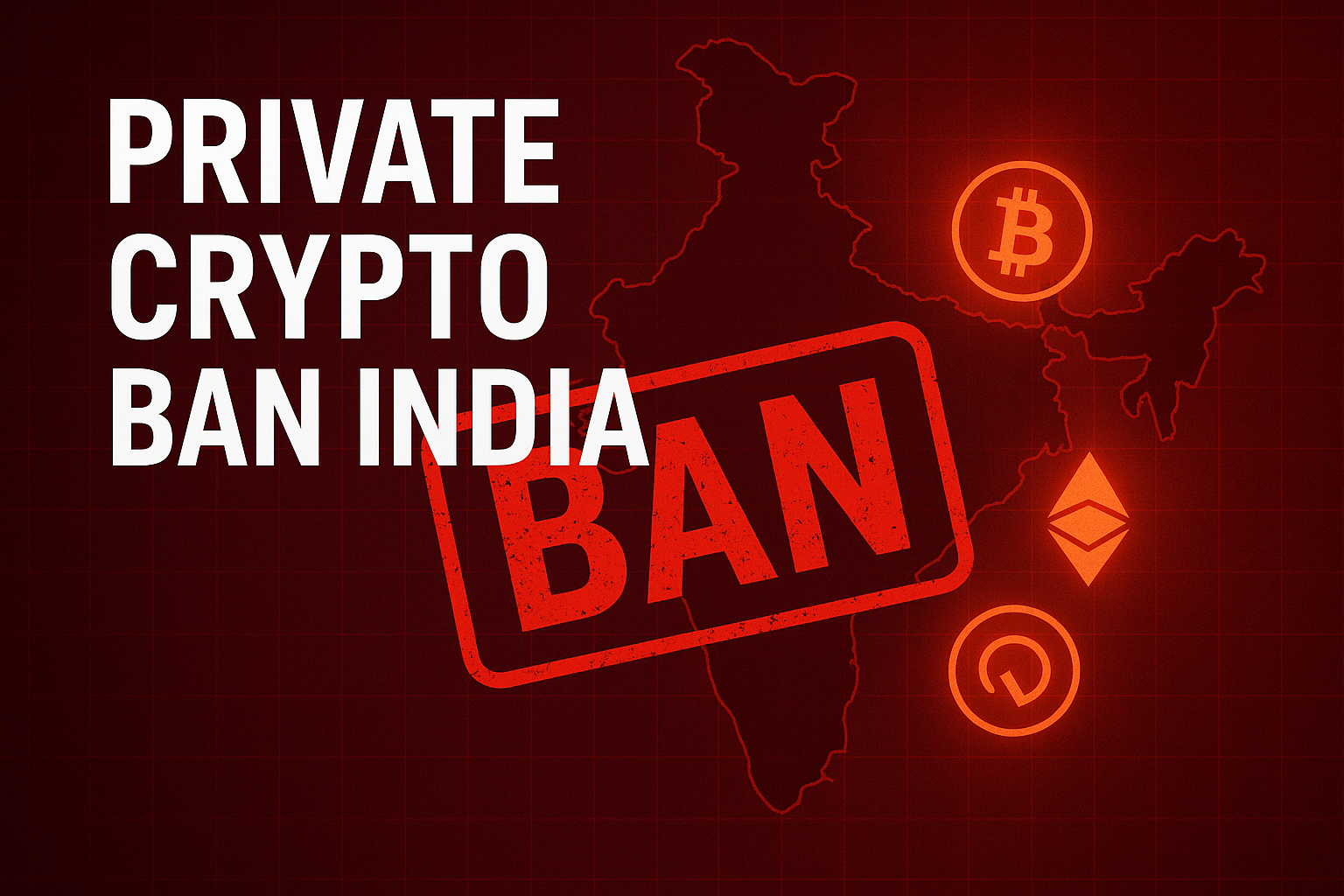The topic of a private crypto ban in India has captured the attention of investors, fintech firms, and policymakers alike. While many anticipate a sweeping prohibition on privately-issued digital assets, the actual regulatory environment in India remains complex and evolving. This blog examines the status of the private crypto ban in India, how it ties into broader crypto regulation and taxation, and what it means for stakeholders. Understanding this is critical for both domestic and international actors, given India’s large tech-savvy population and growing digital economy.
Historical Context of Crypto in India
To understand the ongoing debate around the private crypto ban in India, it’s essential to trace how the country’s stance on cryptocurrencies has evolved over the past decade.
From early warnings by the Reserve Bank of India (RBI) to the landmark Supreme Court ruling in 2020, India’s regulatory journey has shifted between caution, prohibition, and cautious acceptance. The following sections outline the key milestones that shaped India’s crypto ecosystem.
The early years and caution
- In 2013 onwards, the Reserve Bank of India (RBI) issued warnings about cryptocurrencies, citing fraud and volatility.
- In April 2018, the RBI directed regulated entities to stop dealing with crypto firms.
The banking ban and the Supreme Court reversal
- The RBI’s banking ban made it nearly impossible for crypto exchanges and wallets to operate normally.
- In March 2020, the Supreme Court of India overturned the RBI’s circular, finding it disproportionate.
The call for a private crypto ban
- In 2019, the government-appointed Inter-Ministerial Committee (IMC) recommended that “all private cryptocurrencies, except any cryptocurrency issued by the State, be banned” in India.
- Thus, the concept of a ban on private cryptocurrencies in India emerged as a policy option.
Current Regulatory Status in 2025
As of 2025, cryptocurrencies exist in a legal grey area in India, not fully banned, yet not officially recognized as legal tender. While the government enforces strict taxation and compliance measures, the much-discussed ban on private cryptocurrencies in India remains under review. Let’s break down the current legal, tax, and operational status.
Legal but unregulated
- As of 2025, crypto-trading (buying, holding, selling) is not explicitly banned in India.
- Cryptocurrencies are not legal tender in India.
- The status: operational but in a grey zone without full regulatory clarity.
Taxation and disclosure regime
- Under Indian law, crypto assets (termed “Virtual Digital Assets” – VDAs) are taxed at a flat 30 % on gains + cess.
- A 1 % TDS applies to transfers of VDAs above a threshold.
- Exchanges must register with the Financial Intelligence Unit – India (FIU-IND) under anti-money-laundering rules.
The ban is still possible, but not implemented
- The draft bill recommended the blanket prohibition of private cryptocurrencies.
- However, the bill has not yet been enacted, and India has not issued a full ban.
What the “Private Crypto Ban” Would Cover
If implemented, the private crypto ban in India would fundamentally alter the structure of the country’s digital asset market. The proposed bill outlines strict definitions, penalties, and transition timelines, leaving little room for private token activity. Here’s what the potential law entails.
Definition of scope
From the draft bill:
- “Cryptocurrency” is defined as any digital token not being an Official Digital Currency, offering value exchange, a store of value, a unit of account, etc.
- Ban would apply to: mining, generation, holding, selling, transferring, or using such crypto for payments.
Transition and Penal Provisions
- There was a proposed 90-day “transition” after enactment for holders to declare & dispose of crypto.
- Penal provisions could include imprisonment of 1-10 years and/or a fine of up to three times the gain or loss caused.
Relationship with CBDC
- A key driver: The ban is pitched alongside the creation of a State-issued digital currency (“digital rupee” or official digital currency), which the government would fully control.
- Hence, the term private crypto ban in India refers to banning non-state digital assets while allowing an official digital currency.
Why India Is Considering a Private Crypto Ban
The government’s rationale for a ban on private cryptocurrencies stems from multiple economic, regulatory, and security concerns. While innovation remains a priority, the authorities seek to balance technology adoption with systemic risk management.
Risks identified
- Volatility: Private cryptocurrencies are highly unstable, making them unsuitable as money.
- Decentralization: Lack of central authority, no issuer oversight → regulatory risk.
- Anonymity & Misuse: Facilitation of money-laundering, terrorist financing, etc.
- Monetary Policy Interference: Large-scale use could impact the RBI’s control of money supply.
Innovation vs Control Balance
- The government recognizes that the underlying Distributed Ledger Technology (DLT) has promise, and wants to preserve that.
- Meanwhile, the state wants to maintain sovereignty over currency and payments via the CBDC route.
Global considerations
- India must align with global regulatory norms, fight regulatory arbitrage, cross-border flows, etc.
Implications for Investors and Businesses
A private cryptocurrency ban in India would have sweeping effects across multiple stakeholder groups, from retail investors to fintech start-ups. The table below summarizes potential outcomes and action points for each category.
| Stakeholder | Implications of a Private Crypto Ban in India | Practical Action Items |
| Retail investors | Potential forced liquidation or exit of holdings if a ban is enacted | Monitor regulatory updates; be cautious with unregistered exchanges |
| Crypto exchanges | May face a ban, shutdown, or need to transition to a state-sanctioned model | Ensure registration, AML/KYC compliance, and evaluate exit or pivot strategies |
| Start-ups / Fintech | Business models relying on private crypto may be invalidated | Diversify into CBDC-related DLT use-cases, localize operations |
| Foreign investors | Regulatory risk increases; potential asset value suppression | Conduct jurisdictional risk assessment; hold assets overseas or hedge accordingly |
| Payment/merchant services | Use of private crypto for payments may be prohibited | Prepare for payments in fiat/CDC, integrate alternative channels |
Investor takeaway
- If the ban happens, the “private crypto ban in India” could dramatically reduce liquidity and value of private tokens in Indian markets.
- Until then, high tax (30 % gains) + TDS (1 %) already make India a difficult environment.
- Yes: trading is allowed, but not payments or currency usage. Use ‘legal grey’ accordingly.
For businesses
- Firms should not assume unrestricted use of private crypto for payments or rewards in India.
- Rather, businesses can focus on DLT infrastructure, token schema for loyalty points not classified as cryptocurrencies, or await clearer regulation.
Likely Scenarios for the Future
The future of crypto regulation in India could unfold in multiple directions, from a total ban to a licensed framework or a continued grey zone. Each outcome presents unique challenges for investors and innovators.
Scenario A – Ban Enacted
- India passes the bill banning private cryptocurrencies.
- Holders must declare assets, sell or convert within a defined window.
- Market for private tokens in India sharply contracts; only state-issued digital rupee remains.
Why it matters: Market exit risk for private crypto players in India; currency innovation may be centralized.
Scenario B – Regulation Instead of Ban
- The government decides not to ban, but introduces a full regulatory/licensing regime.
- Private cryptocurrencies continue, but under tight oversight (KYC/AML, reserve, listing rules).
Why it matters: More favorable for innovation, but still may carry high compliance costs and tax burden.
Scenario C – Continued Grey Zone
- No ban, no full regulation for some years. Tax regime tightened; enforcement actions ramp up.
- The existing regime persists (30 % tax, 1 % TDS), but legal clarity remains lacking
Why it matters: Uncertainty remains high, and investors face a regulatory risk premium.
Key Metrics and Data Points
- 30% flat tax rate on gains from Virtual Digital Assets in India.
- 1% TDS on crypto transfers above thresholds.
- The IMC (2019) report recommended banning all private cryptos.
Conclusion & Why It Matters
The notion of a private crypto ban in India represents one of the most significant regulatory risks for global crypto investors and businesses targeting the Indian market. Although a full ban has not yet been enforced, the draft legislation and policy signals indicate that non-state digital assets may face severe restrictions or elimination.
For investors, the message is: high reward comes with high regulatory risk. For businesses, aligning with compliance, monitoring legislative developments, and preparing contingency strategies is essential.
Investor Takeaway: If you hold or plan to acquire private cryptocurrencies with Indian exposure, factor in the possibility of regulatory exit or value compression.
Business Takeaway: Use this time to pivot into compliant models (e.g., tokenized real-world assets, DLT services, or CBDC-adjacent solutions) and avoid depending on a business model that assumes unlimited private crypto usage in India.
Read More:
- Crypto Better | Analysis | Price | Trends & Predictions | 2025
- JAMBO Crypto Price Prediction 2026–2030 | Bull, Base & Bear Forecast
- Crypto Batter | Secure SIM, Fast Data & Full Ownership Tracking | 2025
FAQs:
What is the Private Crypto Ban in India?
It refers to proposed restrictions on non-government digital currencies for financial security and investor protection.
Are cryptocurrencies like Bitcoin or Ethereum banned in India?
No, they aren’t banned yet, but regulations and taxation rules make them tightly monitored by Indian authorities.
Why is India considering banning private cryptocurrencies?
To prevent money laundering, protect investors, and promote a government-backed digital rupee through the RBI.
Can Indian investors still trade cryptocurrencies legally?
Yes, investors can trade on compliant exchanges under strict KYC and 30% crypto tax regulations.
How will the crypto ban affect Indian startups and businesses?
It may limit blockchain innovation and fundraising while increasing reliance on government-regulated digital assets.








